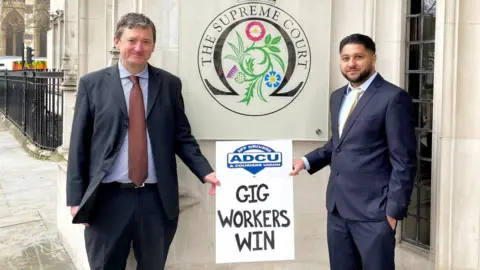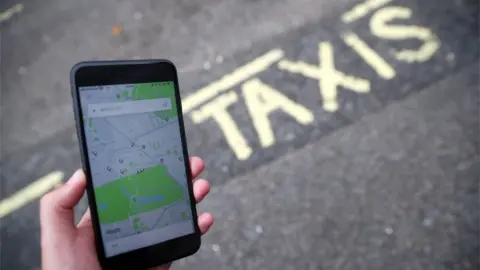Uber 'willing to change' as drivers get minimum wage, holiday pay and pensions
Uber has insisted its fares will not rise after saying that its 70,000 UK drivers will be guaranteed a minimum wage, holiday pay and pensions.
The ride-hailing giant said drivers would earn at least the National Living Wage, or £8.72 an hour, in a move that could shake up the wider gig economy.
It comes a month after it lost a legal battle in the UK over drivers' status.
Uber said it was "turning the page" on workers' rights, but some said it had not gone far enough.
Analysts also warned the company had increased prices in California after a similar ruling and was likely to do the same in the UK.
Writing in the Evening Standard, Uber's chief executive Dara Khosrowshahi said: "This is a significant improvement in the standard of work for UK drivers. But I know many observers won't pat us on the back for taking this step, which comes after a five-year legal battle.
"They have a point, though I hope the path that we chose shows our willingness to change."
 Getty Images
Getty ImagesUnion leaders and employment experts said Uber's move would have far reaching consequences for the gig economy. Bates Wells lawyer Rachel Mathieson, who represented Uber drivers fighting for worker rights, called it "a very significant milestone".
However, one union complained Uber would still not pay drivers for the time they spent waiting in between jobs.
The changes also do not apply to couriers in its food delivery business, Uber Eats, who remain self-employed.
How did we get here?
In February, Uber lost the third and final stage of a five-year legal battle with drivers who claimed it had wrongly classified their employment status.
It argued it was a third-party booking agent, and its drivers were self-employed.
But the Supreme Court ruled its drivers were workers, a category that means they are entitled to minimum legal, holiday and pension rights.
Uber was not legally obliged to grant these benefits across its business, but it was facing further action from drivers as well as calls for compensation for past missed entitlements.
The company is also being challenged by its drivers in many other countries over whether they should be classed as workers or self-employed.
What happens now?
Uber, which is worth $110bn but has never made a profit, said the changes to its UK drivers' pay would come in from Wednesday, and form an earnings floor, not an earnings ceiling.
The company said the new rates would come on top of free insurance to cover sickness, injury and maternity and paternity payments which have been in place for all drivers since 2018.
Uber says:
- It will pay at least the National Living Wage for over-25s, irrespective of a driver's age, after accepting a trip request and after expenses
- All drivers will be paid holiday time based on 12.07% of their earnings, paid out on a fortnightly basis
- Drivers will automatically be enrolled into a pension plan with contributions from Uber alongside driver contributions, setting drivers up over the long term
- It will continue free insurance in case of sickness or injury as well as parental payments, which have been in place for all drivers since 2018
- All drivers will retain the freedom to choose if, when and where they drive
 ADCU Union
ADCU UnionWhat does Uber say?
Jamie Heywood, regional general manager for Northern Europe at Uber, said: "Uber is just one part of a larger private-hire industry, so we hope that all other operators will join us in improving the quality of work for these important workers who are an essential part of our everyday lives.
"Drivers have consistently told us that they wanted both the flexibility that we provided but also they wanted the benefits and we've been struggling to find a way of bringing those two together in a way that work for us and work for drivers," he said.
Uber pointed out in its statement announcing the changes that a worker is a classification that is unique under UK employment law. Workers are not full-blown employees but are entitled to the minimum wage, holiday pay and a pension.
The company said the recent UK Supreme Court ruling had provided a clearer path forward as to a model that gives drivers the rights of worker status - while continuing to let them work flexibly.
 Reuters
ReutersAre unions and drivers happy?
Boss of the TUC union body, Frances O'Grady, said the announcement was "really important because it shows that no multi-national company however big is above the law".
But she suggested Uber was trying to "cherry pick" from the Supreme Court's ruling, which said Uber should consider its drivers as workers from the time they logged onto the app, until they logged off.
Instead it will only commit to these entitlements from the time a trip is accepted to the drop-off.
James Farrar and Yaseen Aslam, the two former drivers who sued Uber over worker status, said the company was still "short changing [drivers] to the tune of 40-50%".
"Also, it is not acceptable for Uber to unilaterally decide the driver expense base in calculating minimum wage. This must be subject to collective agreement," they said.
Others pointed out that Uber had said nothing about compensating drivers for past entitlements they had missed out on.
What could the impact be on the wider gig economy?
Despite the reservations, employment experts and unions heralded Uber's announcement as a big step forward for workers' rights that would be felt across the gig economy.
Nigel McCay of law firm Leigh Day, which represented Uber drivers in the recent court battles, told the BBC: "We see so many other operators using this employment model which is questionable.
"And they'll now see this decision and think: 'Hang on, if Uber have had to finally give in and accept that the drivers are workers then how long are we going to be able to sustain an argument that our workers shouldn't be entitled to those rights?'"
Uber competitor Bolt told the BBC it had no plans to change its driver's conditions, as they "already make more with Bolt compared to other ride-hailing companies because our commission rates are lower".
However, it said it would continue to consult with its 50,000 UK drivers to make sure "any changes we make directly benefit them".
Mary Walker, partner and employment lawyer at law firm Gordons, said the additional costs facing the gig economy mean "some businesses will simply be unable to continue trading". Other firms will be able to restructure, but perhaps with fewer workers, she added.
Union leaders also warned other gig economy firms they would have to change. "This is the end of the road for bogus self employment," said Mick Rix, national officer of the GMB union, which has been fighting for employment rights through the courts.
"It's a shame it took the GMB winning four court battles to make them see sense, but we got there in the end and ultimately that's a big win for our members. Other gig economy companies should take note," Mr Rix said.


Union reps could barely contain their delight at Uber's announcement.
After years of court battles, they portray this as a win of David over Goliath.
And they are hopeful it might create a domino effect.
Other gig economy companies have likely been looking closely at the Supreme Court's verdict in February.
The fact that Uber has chosen to fundamentally change its system rather than fight on might encourage others to do the same.
Uber has disrupted markets globally; this move could have repercussions around the world.
